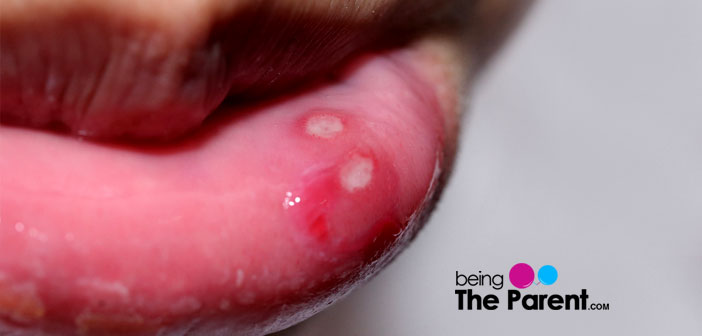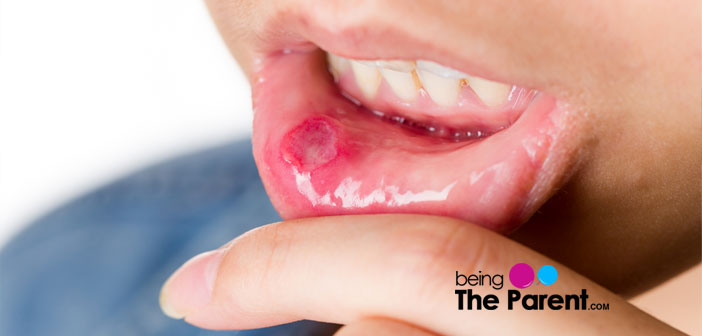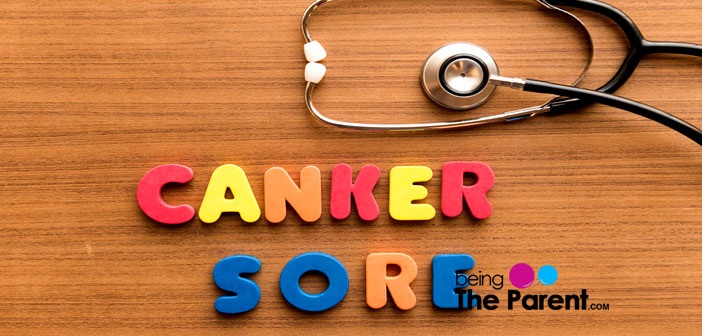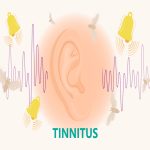
Canker Sores In Children- Symptoms, Causes, Treatment And Prevention
5 min readWritten by Editorial Team

Mouth ulcer or canker sores is not entirely a grown up’s issue. Children under the age of 10, though rarely, are also found affected by this condition. Canker sores can make eating and talking difficult.

What Are Canker Sores?
Canker sores, also called aphthous ulcers, are small white or yellow colored sores with a reddish ring or halo that appear under the cheeks and lips, under the tongue or at the base of the gum or even in soft palate (the fleshy part of the hard roof of the mouth). Even though it is small in size, it can cause severe pain which makes eating and drinking challenging for your baby.
Canker sores can cause no harm to children. They generally last for a week or two and slowly heal on their own.
What Are The Symptoms Of Canker Sores In Toddlers?
The symptoms of canker sores that may be observed in toddlers are:
- More often, shallow and small but painful open sores with a bright red border with the white, gray or yellow center
- Your child may mention tingling in the area few days prior to the appearance of the sore
- Though usually it appears individually, it can also appear in small clusters
- Children refuse to eat because of the pain and irritation caused by the sores
- Not accompanied by fever or swollen lymph nodes
What Causes Canker Sores?
Specialists and scientists have not achieved a clear agreement on the reasons behind canker sores. In any case, there are several factors which can contribute to this condition. Some of these factors include:
- Food allergies: Some children who develop an allergy towards chocolates, eggs, citrus fruits like oranges and limes, fried and spicy food, dairy products, etc. are sometimes found to develop canker sores
- Nutritional (dietary) deficiencies: Children who suffer from some nutritional deficiency of specific vitamins such as iron, folic acid, zinc, or vitamin B-12 are found to develop canker sore more frequently
- Mouth injuries: Some kind of trauma or injury such as biting accidentally inside the mouth can also bring in canker sores
- Emotional stress: Toddlers undergoing some kind of emotional stress are found to develop the canker sores
- Immune system: Children with weak or overacting immune system are also found to get canker sores
- Viral infections: A child who has just recovered from some viral infections are found to develop canker sores
- Genetic reason: Sometimes canker sores tend to run in the family indicating the genetic reasons
- Drug reaction: Recurring canker sores are more often linked with the reaction of some medicines that the child used to take
- Toothpaste and mouthwashes: Sodium lauryl sulfate (SLS) is an ingredient in many kinds of toothpaste and mouthwashes. This is a cause found behind many cases canker sores and it can also increase the healing time of the sores
- Hard brushing: Brushing teeth hard enough to damage the delicate lining of the mouth can trigger canker sores
- Crohn’s disease: This is an inflammatory bowel disease (IBD) causing the inflammation of the lining of the gastrointestinal tract anywhere between mouth to anus. If the child has this disease, occasionally, he can develop a canker sore
- Behcet’s disease: It is a rare disorder which causes the inflammation of the blood vessels throughout the body. Mouth sores are commonly reported in cases of Behcet’s disease

Is Canker Sores A Contagious Condition?
Canker sores are not caused by any harmful microbes (like virus)and hence are not contagious.
When Should I Seek Medical Attention For My Child Experiencing Canker Sores?
You should take your child to consult the doctor if:
- The sores are larger and deeper and don’t even start to heal or don’t show any decrease in the pain in spite of giving home remedies for more than ten days
- If more sores appear before the first sore is healed
- If your child develops a fever
- If your child develops swollen lymph nodes
- If the sore appears more than three to four times a year
What Is The Difference Between Canker Sores And Cold Sores?
Cold sores and canker sores are often confused with each other. Both are totally different issues. It is important to understand the difference between the canker sores and cold sores to take the proper treatment.
| Difference Between Canker Sores And Cold Sores | |||||||
|---|---|---|---|---|---|---|---|
| Canker Sores | Cold Sores | ||||||
| Develops inside the mouth and on gums. | Develops outside the mouth more often on or around the lips. | ||||||
| Pain inside the mouth especially while eating and drinking. | Pain around the mouth or on affected area. | ||||||
| Non-contagious. | Contagious. | ||||||
| The cause is not clearly defined. | Caused due to herpes simplex virus. | ||||||
| Appear as small, white or yellow open sores surrounded by a reddish ring. Can be single or in groups. | Appears as red fluid filled blisters and are typically found in groups. | ||||||
| Quicker healing is possible in most cases without the treatment of any kind. | As the blisters are extremely painful and go away only very slowly if left alone, treatment is required. | ||||||

How Can Canker Sores Be Prevented In Children?
You can reduce the chances of your child getting canker sores by:
- Switching the toothpaste used by your child (if it contains the foaming agent sodium lauryl sulfate) with the toothpaste which is free from SLS
- Avoiding or reducing acidic and spicy food from the menu and aerated soft drinks which can trigger the sores and are not healthy otherwise too
- Give the child soft bristled tooth brush. Also, ask him (or make him) not to brush too hard as it can damage the inner lining of his mouth
- Make sure the child is having well-nourished food
How Can Canker Sores Be Treated In Toddlers?
If you avoid the food items that can aggravate the sores (never give him hot food), that alone is a good treatment. Applying ice on the sore helps to numb the area and thus the pain. Giving him ice pops can also help in reducing the pain.
Most of canker sores in the toddlers are found to go away within a week or two without any treatment. Definitely (if there are no underlying problems) the intense pain will reduce progressively within 4 to 5 days. If the sore is causing immense pain, that your child can’t eat or drink properly, then the doctor-
- May apply teething cream directly to the sore so that the area becomes numb which allows the child eat and drink without much pain
- Sometimes, depending on the severity the doctor may prescribe some mild pain relievers

Editorial Team,
With a rich experience in pregnancy and parenting, our team of experts create insightful, well-curated, and easy-to-read content for our to-be-parents and parents at all stages of parenting.Read more.
Responses (0)
Want curated content sharply tailored for your exact stage of parenting?
Related articles

Tinnitus in Toddlers – What is it and Top Causes

Functional Play For Toddlers – Why is it Important and Top Ways to Encourage

Top Healthy Snack Ideas For Toddlers (12 to 24 Months)

Toddlers Keep Falling a Lot – Why and When Will the Balance Improve

Top 10 Preschools in Mumbai For 2024 – 2025

Common Genital Problems in Toddlers
Sponsored content
Discover great local businesses around you for your kids.
Get regular updates, great recommendations and other right stuff at the right time.





